Community
Hello fellow Sojourners!
This is a brief missive for your enjoyment. I just returned from the Wild Goose Festival in Corvallis, Ore.
Yes, Oregon and not North Carolina. You see, in a fit of wisdom, the good people of Wild Goose found a west coast location. I hope it worked well for them because I'm sold on the place.
I wish you could have been there. It was amazing. To tantalize you into attending next year, here (in no particular order) are Nine Good Reasons to Attend The Wild Goose Festival.
1. There are no bugs.
None. Well, some flies, but this is Oregon and not North Carolina and though the nights are chilly and the mornings moreso (I awoke the last morning to see my breath in the air), the sun arose and everything warmed up to make for some of the most beautiful weather you'll ever experience.
2. All the notables are there.
Rachel, Richard (and Richard), Brian, Nadia, Gareth, Bruce, Christian, Amy, Yvette, Hilary, Greg, Steve...So many people to meet and to know.

I hadn't a clue that I was on the forefront (apparently) of a huge trend when I got my first tattoo or when, at age 20 while visiting London, I was daring enough to pierce my nose. While sartorially I may fit in, beneath the surface, surrounded by my likewise trendily tatted and pierced friends, I don't fit. In fact I had to stop attending that church because I was tired of feeling as if whom God has called me to be isn't OK.
Even at the very place I had gone to connect with God, I still felt a distant from God's people.
Here's the catch: I am not just your average church attender. I am a young, by all accounts "hip" female pastor. After a couple of years of hard work at a prestigious seminary, I am blessed to be one of the those set apart for ordained ministry. I am, in fact, the preaching pastor at a church in southern California....
I am stuck between two worlds — the evangelical world where I am too liberal (by virtue of my vocation and career) and the mainline Christian world where I often feel disappointed by the lack of passion. I don't think it would be as bad if people in both worlds didn't feel the need to question who I am. But they do.

In what is being described as the first of its kind in the U.S., the Archdiocese of New Orleans has transformed a vacant church rectory into a group house where single women will live together while deciding whether to undertake lives as nuns.
The center, dedicated on Aug. 15, occupies the second and third floors of the St. Rita rectory. Within a few days, two women, then perhaps three more, will move into the spotless rectory, their collective lives to be superintended by two veteran nuns who will show the younger women the dynamics of shared community life.
“How we live in community. How to communicate. How to share,” said Sister Carmen Bertrand, for 48 years a member of the Sisters of the Holy Family.
Beyond orienting them to the rhythms of community life, Bertrand and her colleague, Sister Diane Roche, a Religious of the Sacred Heart, will teach the tenants various modes of prayer, organize occasional retreats, and bring in representatives of other religious orders to present themselves and their ways of life.

I love the Church. I have literally been going to church my whole life — that is, until two months ago.
Then I stopped cold turkey. You can read about it in my post "Walking Away From Church."
Masses of people responded. It astounded me. Most ministers expressed concern saying things like, “My Brother, I am worried that you may be on a dangerous journey,” or, “I fear you may lose your faith.”
Frankly, what I heard them saying was, “Faith is so fragile it needs the Church to enforce it,” which only made me more certain I was making a remarkably healthy spiritual choice.
Former church-going folk frequently told me things like, “There is a large disconnect between the 'Church' of today and the teachings of Jesus,” and “I have found God in a dynamic, deep way and I love God so much more and for real now than when I was unwittingly trying to fit in with my church culture.”
I've been away from church for two months now and I have to say, I am more at peace than I ever have been. My faith is stronger than it ever has been. My family life is healthier than it ever has been. My desire to seek out God and follow the teachings of Jesus is stronger than it ever has been.
I do not want to go back to Church because life outside of Church is better. It just is. There's no dogma complicating the path to God. It is more than refreshing to escape the games church-folk play with the intent of establishing control and “rightness” on their part; it is life-giving to escape it.
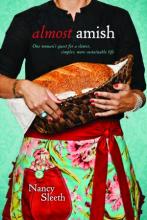
The Amish are by no means a perfect people, and there are dark sides to their history. Their example, however, does have much to teach us. How can we incorporate the best of Amish principles into our modern lives? To answer this, I did some reading. And some visiting. And some listening. I in no way pretend to be an expert on the Amish, but the more I read and visited and listened, the more I found to admire. The Amish are islands of sanity in a whirlpool of change.
Along the way, I discovered some Amish principles that we can all try to emulate. These principles (similar to the list that Wendell Berry laid out more than two decades ago in Home Economics) provide guidelines for a simpler, slower, more sustainable life. They offer me hope.
IN MAY 2011, I found myself in France, sitting with brothers of the Taizé ecumenical monastic community, talking about the history of my people, the Lakota.
After evening prayer, the prior, Brother Alois, invited a few of us to join him for supper. This special gathering was held in the bedroom of Brother Roger, founder and first prior of the Taizé community. His room has been kept the way he left it when he died in 2005. The room held a small shelf filled with books, a few furnishings, and a table by the large window. The walls were painted a mango orange color that seemed to enhance the already spirit-filled space. The light in the room became warmer and softer as the sun set.
While eating we talked about many things related to the Lakota, in particular, and First Nations peoples in general. The brothers’ questions were heartfelt, and they listened intently to my every word. At some point during the conversation, I came to a new understanding. This time of breaking bread and conversation was a sacred time. It was Eucharist.
I was born and raised in South Dakota where my people, the Oglala Lakota, reside on the remnants of our original homeland that make up the Pine Ridge Reservation in southwestern South Dakota. One of my earliest memories is hearing the drum and singing late into the night and feeling the earth reverberate from the deep bass of the drum as both sound and feeling lulled my siblings and me to sleep.
Like most people, I knew very little about what the Taizé community actually does, other than their music. I owned a collection of chants on CD. I’d sung a couple of chants in English during worship services over the years. It wasn’t until Brother John from Taizé came to Pine Ridge in 2010, and I was asked to be his host, that their work for reconciliation became clearer to me.
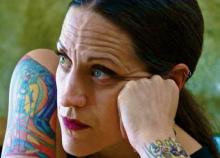
Editor's Note: God's Politics contributor, Nadia Bolz-Weber, recently delivered an address to the Evangelical Lutheran Church in America's (ELCA) Youth Gathering in New Orleans, where she told the story of her spiritual journey from tattooed, alcoholic ne'erdowell to tattooed, 20-years-sober, Lutheran minister. Nadia's is a powerful tale of redemption, God's unconditional love, and staggeringly real grace.
Nadia told the thousands of Lutheran youth gathered in the Big Easy earlier this month:
Some of your parents and some of your pastors were really upset that I was your speaker tonite. They felt like I was someone who should not be allowed to talk to tens of thousands of teenagers. And you know what I have to say to that? They are absolutely right.
Somebody with my past of alcoholism and drug abuse and promiscuity and lying and stealing should not be allowed to talk to you. You know what? Somebody with my present — who I am now — shouldn't be allowed to talk to you because I am sarcastic, heavily tattooed, I swear like a truck driver — they're having a heart attack back there, going, "Please help her not swear."
I am a flawed person. I should not be allowed to be here talking to you. But you know what? That's the God we're dealing with, people.

I want to point out three things, regarding Paul's analogy of the fruit of the Spirit.
1. It's not something we can acquire by simply trying harder. Throughout Galatians, Paul dismantles the idea that all God wants is for us to try harder, to do more things, to count on our achievements to gain right standing with God. The fruit of the Spirit comes when the Spirit is living in us.
To state the obvious: if you want an apple, you grow it. You plant the seed, you water it, you care for it, you allow for whatever factors you have no control over — weather, for example — and you trust and hope that, in the right time, the tree will spring up, it will blossom, and it will bear the fruit you’re looking for. It takes time and effort, and even then, we have no guarantee of what, where, when, or how something is going to appear.
Have you ever heard someone pray for patience now? It kind of misses the point of what patience is, doesn’t it? I definitely think we should be praying for these things, but don’t expect them to be just placed in your lap — “Here’s the love for your neighbor you requested!" Absolutely, there are times when God pours out a supernatural measure of peace or joy on us, but more often than not, instead of just giving us those things, God gives us opportunities to learn those things — love, joy, gentleness — and he gives us his Holy Spirit to be with us at all times, including those times, and the Spirit brings peace and joy in the midst of those things, so thatwe can cultivate the life framework to sustain it all, to grow a healthy soul, where we learn how to weave body, mind, and spirit into one cohesive whole.
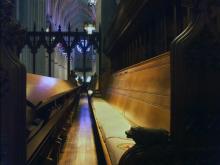
The most amazing thing happened this week.
Maybe you missed it.
The Episcopal Church held their General Convention in Indianapolis, Indiana. They gathered. They prayed. They sang. I'm told there were a few sermons, too! And you know they offered the Eucharist. They can't do anything without someone bringing bread, wine, and a blessing. God love 'em.
This week they voted, too. They held up in their bicameral way of doing things and worked out some key issues. Among the issues at hand were whether or not to sell their offices in New York City and to find ways of investing their income in the future of the denomination. They did both. If you followed them on Twitter (Many did. #GC77 trended right up there!), then you know that there was hope and joy in their rooms. This is not why they made the news, of course. They made the news when they voted to formally allow for same-sex blessings within their communion.
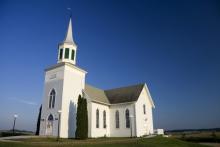
Micah Bales asked a deep question. He suggests that the wealth in property we’ve inherited is hindering our work for social justice. He talks provocatively (as a spiritual challenge, he clarifies) about “burning the meetinghouse.” He asks, “What would happen if we put the movement of the Spirit ahead of property management?”
As I passed churches the other day I asked myself, “If there are so many churches in America, why does America look so unlike the Kingdom of God? Why are we strangers to our neighbors? Why do we have homeless poor among us? Why do sweatshops produce the majority of our goods? Why do we have the greatest per-capita incarceration rate in the world? Why are we choking the earth with fossil fuels?”
Many non-Christians lay the sins of our nation and even the world at the feet of the church. After all, a 77 percent of us self-identify as Christians (in 2009). So why is it that the Christian faith, the self-avowed enemy of greed, has allowed this world to happen?
I think that our churches have been slowly converted by the logic of the market, a logic which Paul called “the world.” Jesus called his disciples to disregard the economy, and later, in the midst of the Roman empire, the Acts church built centers of economic and spiritual wholeness that offered a concrete alternative to the mandatory emperor-worshipping cult which was physically represented by Caesar’s head on the golden coin: the money system. There was a prophetic imagination alive in the Acts church.
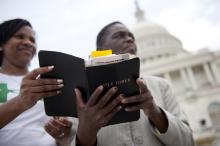
Learning to speak as a Christian is one of the most important and often ignored aspects of our discipleship. Nowhere is this fact more obvious than when churches try to talk about politics. When the small group leader makes a disparaging comment about Mitt Romney’s Mormon faith, or a car rolls into the church parking lot with a “NOBAMA” bumper sticker proudly displayed, what do we do?
Is bumper sticker propaganda and negativity the best we have to offer?
Admittedly it can be risky to talk about politics in the local church. All it takes is one idea or statement that flies in the face of someone’s deeply held convictions and that could be the end of our influence and the end of that person’s involvement in our ministry.
Still, the upcoming presidential election will be the defining cultural event of the next six months. If we completely ignore it we are missing a golden opportunity for discipleship.
How can churches have a healthy conversation about politics in the middle of a national election without demonizing the opposition and causing disunity?
I’ve been working on this question for months now, and as part of my preparation I wrote a book called Public Jesus. Here’s a little bit about what I’ve learned in the process:
1) Love the One You’re With

I have a confession.
(That's rich, right? A minister confessing.)
I have a hard time telling people I'm a minister. Yes, really. I actually tend to handle it this way:
Person: “So, what do you do for a living?”
Me: “I'm a minister... (appropriate pause)... but not the kind you just pictured in your head.”
Sad, I know.
Honestly though, it's worse than that. I'm even very resistant to calling myself a “Christian.” And I'm not even close to the only Christian who feels that way! It's so bad that I have this very conversation with people all the time. There seems to be some kind of “Believer-like-me Radar” which tells people it's safe to talk to me about not liking the“C” word — CHRISTIANITY.

The first wave wrenched the board loose from my fingertips, sending it crashing into my knee and knocking me off my feet.
“You OK, Cath?” I heard someone call from behind me.
“Not really!” I hollered, as someone reached around me to steady the huge stand-up paddle board while I struggled to regain my footing in the icy-cold waters of the Pacific.
My friends, experienced surfers Joel and Rob, appeared at my side, holding onto the board and gently coaching me to wait for the next set of waves to pass before attempting to paddle out toward Second Reef, several hundred yards beyond the shore break.
“You got it?” Rob said, “OK. You’re good to go!”
Gripping the long-handled paddle in one hand, I foisted myself forward (if with less grace than I had hoped) onto the board, while Joel pushed it forward into the momentarily glassy sea between sets.

The 2012 Wild Goose Festival East wrapped up just under a week ago and I am still trying to process my experience there. As I tweeted as I drove away from the fest, I left feeling exhausted, hopeful, and blessed – that strange combination that reflected the emotional impact of my time there. And it was a truly blessed time.
I was honored with the opportunity to speak on The Hunger Games and the Gospel as well as do a Q&A on everyday justice issues at the Likewise tent. I also was able to join Brett Webb-Mitchell on a panel discussion about living with disabilities in religious communities.
But beyond those conversations I was able to help initiate, I also found a generous and safe space to connect with friends, wrestle with difficult questions, and dream of a better world. Such spaces are so rare in my life these days, that finding such at Wild Goose was a precious gift.
There are, of course, the expected complaints about the festival. It was brutally hot (and that is coming from a Texan). I never ceased to be sticky, sweaty, and stinky and there were bugs everywhere. Camping in a field where every action (and parenting attempt) is on constant display is stressful and uncomfortable. And, as with many religious gatherings, there could have been greater diversity.
For the first hour I was there as I nearly passed out trying to set up a tent in the sweltering heat, I was in a panic mode wondering why I was stupid enough to subject myself to the discomfort and imperfection of it all again this year. Yet as I entered into the experience of being a part of this crazy wonderful gathering, those issues (although ever-present) faded in significance as I found myself fitting into a place where I felt I belonged.
1) Tune in. Log off. Let go.
Darting fireflies supplied most of the light that pierced the rural darkness when I arrived at the Wild Goose Festival site on a farm in Shakori Hills, N.C., late last Wednesday night. I left my ballast — a huge duffel bag containing a pup tent and enough bug spray to cover a small village, a suitcase full of mostly tie-dyed clothing, a large computer case and a camera bag — in the 15-person van that had spirited me from the Raleigh-Durham airport to the farm about an hour away.
While I’m not exactly known for packing light when I travel, my unusually cumbersome luggage for the festival contained the various gadgets and gizmos that would allow me to work from my campsite on the farm — live blogging about the festival, complete with video, audio and photos, and the help of four Sojourners interns who were set to arrive Thursday afternoon.
I had barely stepped foot on the campground when I checked my smart phone to see if cell service and the festival’s WiFi were working. They were. Good, I thought. All set to work. It would be a hectic few days covering the festival’s numerous speakers and musical performances, but we’d get it done.
Ah, hubris. Humans make plans. God chuckles and says, “Oh, really?”
The Almighty, it would seem, had better ideas for how I should spend my time at Wild Goose, which takes its name from the Celtic metaphor for the Holy Spirit.

A few weeks ago I (an ordained minster who has gone to church my whole life) walked away from church — for three months. It is what I've decided to do with my sabbatical. You can read about my initial thoughts on my blog or on The Huffington Post. As the journey unfolds, I will be blogging about it in this series entitled, “Church No More.” I hope you will not only follow along, but add your voice to the reflection by commenting or joining the discussion on my FB page.
It might be that the thing which concerned me the most about leaving the church was losing my spiritual community. It's not that I thought the spiritual-but-not-religious folk were helplessly lonely people wandering around seeking a spiritual community. Not at all. I just assumed that it might be immensely difficult to find and plug into a community like that in the course of three months. I also couldn't help but think it would be just a bit — well, fake to seek out a community for the sake of observing them and then leaving a few months latter. Not just fake but somewhat mean spirited and completely missing the point of community.
Here's the thing, I am a minister. I understand myself to be a person who ministers by following the lead and teachings of Jesus. (I also happen to follow the teachings of many other spiritual and/or thought leaders from Buddha to Neil deGrasse Tyson, but that's for another post some other time). Because of that, the idea of life without a spiritual community gives me the heebie-jeebies. (I apologize for using such a technical term, but a duck is a duck is a duck).
SHAKORI HILLS, N.C. — On a swelteringly hot solstice weekend in the southeast, a couple thousand folks gathered in the woods of North Carolina to get their collective goose cooked. An early summer camp like no other, this second annual festival invokes a Celtic image of the Holy Spirit and sparks unlikely convergences inside the great emergence of the contemporary Christian counterculture.
The Goose blends the best of an intellectually engaged faith conference and social justice activist base camp with the sonic frivolity of a modern rock festival and stirs all concepts and collapses all constructs in a steamy potluck stew of primal camp meeting and postmodern tent revival. Without a doubt, the blossoming and beckoning of the Wild Goose movement in North America heralds a bright radical future for today’s Jesus followers bringing the kingdom come.
Wild Goose Festival: Sunday Call to Worship from cathleen falsani on Vimeo.

The second Wild Goose Festival has just ended. I left a piece of my heart in the hills of North Carolina. Ahead is the third WG fest at the end of August in Portland OR. And then there will be next year and the next... The White House sent the Rev. Derrick Harkins (faith outreach director for the Democratic National Committee) to observe and talk with some of us this year. So I guess WG got noticed.
Last year's WG was the first and there were about 1,300 of us there. This year we were closing in on 2000-plus. And now WG is West Coast bound too. The names of the speakers Jim Wallis and all the rest (I spoke 3 times) added up to a "draw" along with the big name musical performers. But the heart of the festival wasn't in the events but in the conversations.
For me the highlight of the festival was the fact that there was no wall of separation between us speakers and performers and everyone there. I spent 4 days talking with lots of people from all over America and other places too, about ideas but also about very personal subjects. I met Ramona who was the cook at the Indian food stand and found she is ill and has no health insurance and I was able to connect her with a friend who knew a friend at the WG fest locally to help her get the full checkup she needs. I could do that because the festival was full of the sort of people who help, love and care so for once there was someone to call.
And I watched the sneak preview of the movie Hellbound that will be released this fall. It happens that I'm one of the people interviewed in the movie but that's not why I say it is one of the best films I've ever seen. We watched it at 11 PM and talked until 2 AM. People were just stunned.
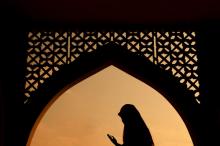
I have been discovering more each day how much I love Muslim people. They are beautiful, warm people, yet we are afraid of them because of misconceptions based on our stereotypes of their race.
I have friends who were living in the Middle East for four years and were sharing about how amazing they find Muslim people. Through my own encounters and my friend’s experiences, here’s what muslim people have taught me.